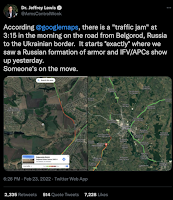For most of recorded history not many things were dependable. Crops were not dependable. Communications were not dependable. Transportation was not dependable. Logistics were not dependable. Income was not dependable. Health was not dependable. We had yet to domesticate the gods of science and nature to serve our ends.
Today, we can routinely move through complex environments with dependable transportation systems that involve millions of moving parts without so much as spilling our coffee, looking up from a game of Wordle, or being late to a meeting. This amazing accomplishment, and others like it, have freed up our brains and provided us with the luxury of focusing our attention elsewhere - and elsewhere is an important place. It's where the future is made.
Our mental "elsewhere" can be a place of hope, joy, compassion, peace, beauty, love, generosity, community, creativity, innovation, trust and exploration. It can also, depending on our circumstances, be a place of darkness filled with grievances, misery, hopelessness, conspiracies, anger, bitterness and resentment. Since elsewhere is where we go to think about and design our future, it is critical that it be a healthy place both mentally and emotionally. All of our building blocks of the future will be biased by the mental and emotional states we are in at the time of development. They will also be biased by our perceived reality.
The challenge we all face as humans is effectively guiding our thoughts and emotions to ensure we plan our futures from the "elsewhere" where we can dependably appeal to "the better angels of our nature," to quote Abraham Lincoln. The future is one very important reason we should be focused on the mental and emotional health of ourselves and the communities around us.
Kevin Benedict
Partner | Futurist at TCS
View my profile on LinkedIn
Follow me on Twitter @krbenedict
Join the Linkedin Group Digital Intelligence
***Full Disclosure: These are my personal opinions. No company is silly enough to claim them. I work with and have worked with many of the companies mentioned in my articles.















